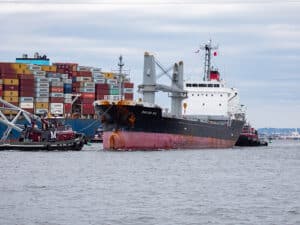
Kitack Lim calls for “ambitious and bold” IMO GHG strategy
Written by Nick Blenkey
At opening of IMO’s GHG working group, Secretary General Kitack Lim urged delegates to be “ambitious and bold.” [Photograph: IMO]
IMO’s Marine Environment Protection Committee will hold its 80th session (MEPC 80) in London, July 3-7, 2023. Among key agenda items, MEPC 80 is expected to adopt an upgraded IMO greenhouse gas strategy.
“The revised IMO GHG Strategy will contain concrete greenhouse gas reduction targets for the sector and is expected to outline a basket of technical and economic measures to be developed to set global shipping on an ambitious path towards phasing out greenhouse gas emissions,” says the official IMO hand out.
The spadework for MEPC 80 is currently underway at the Intersessional Working Group on Reduction of GHG Emissions from Ships (ISWG-GHG 15), which meets June 26-30.
Putting things in a nutshell, environmental groups are hoping that MEPC will set really ambitious and impactful targets, while leading shipping groups are hoping that the “economic measures” will include some kind of carbon tax, with the revenues being used to finance shipping’s green transformation. Submissions on how to achieve this through a “Fund and Reward” system were submitted well in advance of MEPC 80.
What civil society groups are calling for is a revised GHG strategy that would halve shipping emissions by 2030 and reaching zero by 2040 to put the industry on the zero-emission pathway required for achieving the 1.5°C temperature warming limit agreed under the Paris Agreement. They say that a new study from CE Delft provides strong evidence to policymakers that these targets are also economically and technologically feasible.
According to groups such as Pacific Environmental, the CE Delft analysis shows that ships can achieve 36-47% emissions reduction by 2030 compared to 2008 levels by deploying 5-10% zero or near-zero emission fuels, wind-assist technologies, and by “climate optimising” the speed of ships.
They say that the study also concludes that costs associated with these emissions cuts would be manageable. Halving emissions in this decade would only add around 10% to the total cost of shipping operations, a sum that would be dwarfed by the cost of climate related damages to the industry and wider society if shipping fails to cut emissions. University College London estimates that every year of inaction this decade will add an extra $100 billion to the cost of shipping decarbonization.
Shipowners who are already struggling to cope with things like CII and EEXI might have their doubts about the bit about the costs being “manageable,” which is why those “economic measures” are needed.
What nobody wants is for the GHG working group to pass the buck on mandating a truly ambitious GHG strategy to the full MEPC session. In his opening remarks to the working group session, IMO Secretary General Kitack Lim said in words that are about as powerful as his position allows:
“Do not wait for the last minute at MEPC to make the compromises and find the solutions, a positive outcome from this group is key to a success next week, and for the future work of this Organization.
“2023 is IMO’s year of decisive climate action.
“I urge you all to continue with your constructive negotiations, and to be ambitious and bold.”




